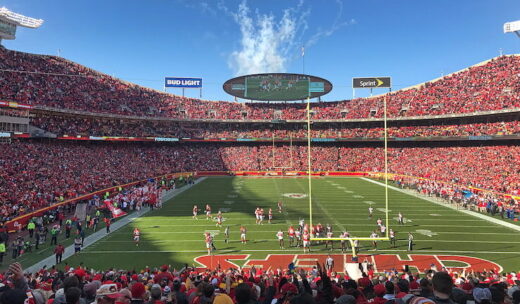
Ask a fan of any top NFL team what they want heading into the post-season, and the answer is the same: NFL playoff home field advantage.
Capturing the number one seed in both the AFC and NFC conferences is a sure-fire way to ensure you play every playoff game at home – but historically, too, since the playoff seeding format was first introduced in 1975, top-seeded teams have won the Super Bowl 26 out of 49 times (53%).
Despite this statistical dominance, remarkably, only one top-seeded team has won the Vince Lombardi Trophy in the past five Super Bowls, which begs the question – how important is home field advantage these days?
We’ve investigated the perceived benefits of playing at home throughout the playoffs, why its effect is seemingly being eroded, and how perceptive bettors can find value in fading the market by backing teams on the road.

Travelling teams can struggle in some NFL Playoff conditions. Image: Karen Eckberg/Flickr
For those unfamiliar with the NFL playoff structure, every game is a win-or-go-home clash. Previous form and regular season results are what gets teams this far, but they count for nothing from this point onwards.
In the NFL playoffs, both the AFC and NFC conferences have seven seeded teams, with the North, South, East, and West divisional winners claiming seeds 1 to 4, followed by three Wild Card teams with the best regular season record.
By rule, who gets home field advantage in the NFL playoffs is determined by the highest-seeded team in each matchup throughout the Wild Card, Divisional, and Championship rounds – with the top-seeded team also receiving a coveted bye-week for the Wild Card round.
Not surprisingly, NFL betting sites tend to favor teams who have secured home field advantage, accounting for the undeniable benefits it offers teams, including:
Playing at home throughout the post-season still doesn’t guarantee a team will reach the Super Bowl, but in the past, it has certainly helped.
In fact, between 1975 (when the seeded playoff formula was first introduced) and 2008, 88% (29 out of 33) of Super Bowls featured at least one, if not both, of the top-seeded teams in the end-of-season NFL showcase event.
Since 2008, though, that percentage has dropped to 69%, with first-seeded teams from either conference not making it to five of the past 16 Super Bowls.
This recent drop in Super Bowl appearances might be linked to inconsistent success rates of NFL home teams throughout various phases of the playoffs.
Analyzing the last 6 NFL post-seasons alone, home teams have won:
This is fantastic news for insightful bettors, as exploiting these trends provides a potential strategy to find a competitive edge over the NFL sportsbooks – often by backing an underdog away team in these highly charged playoff matchups.
The key to creating a successful post-season NFL home field advantage betting strategy is to look to exploit the recent decay in historical home team dominance.
Home field advantage will always give higher seeded teams an advantage given the benefits of advantageous weather conditions, a lack of travel fatigue, and, of course, crowd noise, which is perhaps the reason for Kansas City’s recent dominance given they boast the loudest NFL stadium, which is particularly disruptive during road team offensive play calling.

Arrowhead Stadium. Image: Chris Murphy/Flickr
However, the recent declining win rate of home teams in the playoffs could be due to several factors, which, when leveraged intuitively, can help you upset the odds.
Firstly, elements such as the rise of cold weather teams, such as Buffalo, Philadelphia, and Green Bay, mean cold weather games away from home have become a much more level playing field.
Additionally, consider games played in dome stadiums of Detroit’s Ford Field and Minnesota’s U.S. Bank Stadium, as indoor stadiums essentially negate the winter weather benefits, despite both these in-form teams playing in colder regions of the country.
Finally, consider matchups where, statistically, NFL playoff home field advantage is weakest – namely the Wild Card and Championship round games. Combining these factors could make for a very profitable football post-season.